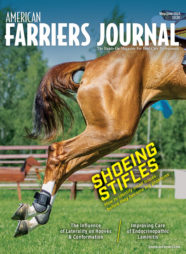A House subcommittee will hold a hearing this week on legislation that aims to end horse soring.
The Energy and Commerce Subcommittee on Consumer Commerce and Protection will conduct a hybrid hearing (watch below) on the Prevent All Soring Tactics (PAST) Act at 12 p.m. (EDT) Thursday, May 26, 2022. The hearing can be attended both in-person in the John D. Dingell Room, 2123 of the Rayburn House Office Building, as well as using Cisco Webex online video conferencing. The hearing will be chaired by Rep. Janice Schakowsky, D-Ill.
The PAST Act (H.R. 5441), which first was unveiled in 2012, is legislation that if passed into law will amend the Horse Protection Act (HPA) of 1970 by prohibiting various acts, improving enforcement and strengthening penalties. The bill is co-sponsored by Schakowsky; Rep. Steve Cohen, D-Tenn.; Rep. Brian Fitzpatrick, R-Pa.; and Rep. Vern Buchanan, R-Fla.
“The practice of soring, which is the intentional infliction of pain on horses’ feet and legs using caustic chemicals, chains, weighted shoes, hard objects, cutting and other gruesome techniques to force them to perform a pain-based artificially high-stepping gait known as the ‘Big Lick,’ is completely unacceptable, inhumane and unsportsmanlike,” Cohen says. “Unfortunately, the practice has marred the Tennessee Walking Horse and related breeds for more than 6 decades. I am proud to reintroduce the PAST Act to finally eradicate this indefensible practice and show that Americans will treat animals humanely.”
If enacted, the legislation, which has 256 co-sponsors, would prohibit the use of action devices and pads on Tennessee Walking Horses, Spotted Saddle Horses and racking horses. The legislation defines an action device as “any boot, collar, chain, roller, or other devices that encircles or is placed upon the lower extremity of the leg of a horse in such a manner that it can rotate around the leg or slide up and down the leg, so as to cause friction; or strike the hoof, coronet band, fetlock joint, or pastern of the horse.” The legislation does not consider soft rubber or soft leather bell boots or quarter boots that are used to protect the foot as an action device.
The PAST Act also would eliminate self-policing by requiring the United States Department of Agriculture to assign a licensed inspector if the show’s management intends to hire one. It also increases the penalty from a misdemeanor to a felony with a maximum of 3 years of incarceration, fines of as much as $5,000 and permanent disqualification of three-time violators.
Sen. Mike Crapo, R-Idaho, and Sen. Mark Warner, D-Va., introduced an identical bill (S. 2295) June 24, 2021. It has been referred to the Committee on Commerce, Science and Transportation. Both versions must be passed by the respective legislative wings of Congress and signed into law by President Joe Biden before it is enacted.
The Tennessee Walking Horse Celebration, the largest horse show for the breed, maintains that the PAST Act will effectively eliminate the industry and its competitions. It supports Protecting Horses from Soring Act of 2022. The House version (H.R. 6341) was introduced Dec. 23, 2021, and referred to the House Committee on Energy and Commerce. The Senate version (S. 4005) was introduced April 5, 2022.
“Bad actors are using caustic chemicals, pressure shoeing and other harmful practices to undermine the prestige of the industry,” says Sen. Marsha Blackburn, R-Tenn., a co-sponsor of S. 4005. “The Protecting Horses from Soring Act of 2022 will stop these bad actors and ensure that this Volunteer State tradition continues for years to come.”
Both bills would require “objective testing, prevent conflicts of interest, and suspend horses from shows if they are found to be sore.” It also empowers state officials, as well as industry and equine experts who have extensive experience, the authority to ensure consistent oversight of inspections related to horse soring.
A total of 53 horses were disqualified for noncompliance of the Horse Protection Act during the 2021 Tennessee Walking Horse Celebration, according to the United States Department of Agriculture (USDA) report. Designated Qualified Persons inspected 582 horses, finding 53 were noncompliant. USDA Veterinary Medical Officers inspected 135 horses with 39 found noncompliant. The noncompliances included bilateral sore, unilateral sore, prohibited substance, scar rule, action devices and inflammation.
The Tennessee Walking Horse industry provides more than 20,000 jobs and has an annual economic impact of $3.2 billion.
Testimony on Save America's Forgotten Equines Act of 2021 (H.R. 3355) and the PAST Act by Kate Kraska, director of Federal Legislation and Government Affairs at the American Society for the Prevention for Cruelty to Animals (ASPCA) can be found at 30:00 of the video below.
Learn More
- House Reintroduces PAST Act: Bipartisan lawmakers in the United States House of Representatives reintroduced familiar legislation that aims to end horse soring.
- Prevent All Soring Practices Act: Read the proposed legislation that aims to ends horse soring.
- Protecting Horses from Soring Act: Read the proposed legislation that the Tennessee Walking Horse Celebration endorses.








Post a comment
Report Abusive Comment